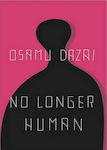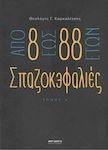Skroutz Buyers Protection
Ο Θάλαμος αρ. 6Code: 437087
- Author: Anton Chekhov
- Publisher: Ekdoseis Govosti
- Μορφή: Soft Cover
- Έτος έκδοσης: 2012
- Αριθμός σελίδων: 111
- Κωδικός ISBN-13: 9789604461776
- Διαστάσεις: 21×14
Anton Chekhov
Buy together

 Top rated
Top rated
Pool Rafts & Inflatable Ride-ons
Intex Inflatable Drink Holder Unicorn White 3pcs
Ad from Gp escapeAdded


 Top rated
Top rated
 Top rated
Top ratedBiographies & Memoirs
Μια Φυσιολογική Ζωή, Actions and escapes of a bounty hunter
Ad from VivliodiktyoAdded
Similar products
All shops
Prices are calculated for:Κύπρος, Other Payment Options
- 3,50 €
- 4,50 €
- 3,60 €
- 4,50 €
- 4,20 €
- 4,50 €
- 3,75 €
- 4,50 €
- 6,00 €
- 4,20 €
Description
The novella "Ward No. 6" marks a turning point in Chekhov's intellectual and literary development. It was first published in the magazine Russkaya Mysl in November 1892. Mitsos Alexandropoulos notes that many critics observed that with this novella, Chekhov broke away from Tolstoy's influence and thereafter charted his own unique literary path.
In an anonymous town in the Russian province, there is a municipal hospital where Andrei Yefimovich Ragin has worked as the chief doctor for two decades. This hospital, described as an institution abandoned by the city authorities, has a wing that houses Ward No. 6. There, what we would call today the psychiatric clinic-asylum of the hospital is "hosted." Five patients diagnosed as "insane" reside in this ward. They are overseen by Nikita, whose behavior embodies the most unadulterated repressive violence infused with the value of duty and "order." As a Greek writer who lived for years in Dafni would say: "The nurses in the psychiatric hospital [...] are not like the nurses everyone knows, who know how to change wounds, give injections, and generally care for a patient. These are strong men with hard hearts who know how to beat the insane, like the animal tamer with his beasts."
"Ward No. 6" (1892) is a striking example of writing. About seven decades later (1964), it was translated into Greek by Aris Alexandrou, who was beginning his brilliant career as a translator of Russian literature. The reissue of "Ward No. 6" now may mark the beginning of a new reading of this work, enriched with our contemporary experience.
Specifications
Specifications
- Type
- Classic Literature & Fiction
- Format
- Soft Cover
- Number of Pages
- 111
- Publication Date
- 2012
- Dimensions
- 21x14 cm
Additional Specifications
- Award winning
- No
- Transferred to the Screen
- No
Important information
Specifications are collected from official manufacturer websites. Please verify the specifications before proceeding with your final purchase. If you notice any problem you can report it here.
Reviews
An excellent novel by A. Chekhov dealing with social, psychological, and philosophical issues in a characteristic realistic style.
Chekhov narrates the life of a doctor in a provincial area of Russia. The doctor takes a position in Ward No. 6, where mental patients are kept, but gradually various problems arise in his life.
Through this story, Chekhov manages to deliver a strong critique of the attitude of the healthcare system of the time towards individuals suffering from mental disorders. The issue of stigma from the social environment plays a central role throughout the story, while neglect and corruption prevail in the hospital. Underestimation, lack of respect, use of violence, coercive "treatment", detention, and violation of basic human rights are depicted in a highly realistic manner by an author who was also a doctor. This role allowed Chekhov to create with impressive accuracy the profiles of the patients as well as the decline of the protagonist. At the same time, existential issues are raised through the lives of the characters and their philosophical views.
Reading this work, one understands the multitude of problems that can afflict a person. Even those considered to have a dignified life may actually face adverse situations that break them. The human mind seems to be ultimately a sensitive construct that can sometimes turn against itself. Finally, something that provokes thought is that the attitude of the healthcare system has not fundamentally changed since the time described by Chekhov: although changes have been made towards a better course, the basic problems still exist.
Translated from Greek ·- Paper quality
- Was it easy to read?
- Was it interesting enough?
- I liked the writing style
- I would read a book by the same author
- I would recommend it for reading
Did you find this review helpful?
Questions
Do you have a question about the product?
14 users have this product and can help you
Ask for the product



































